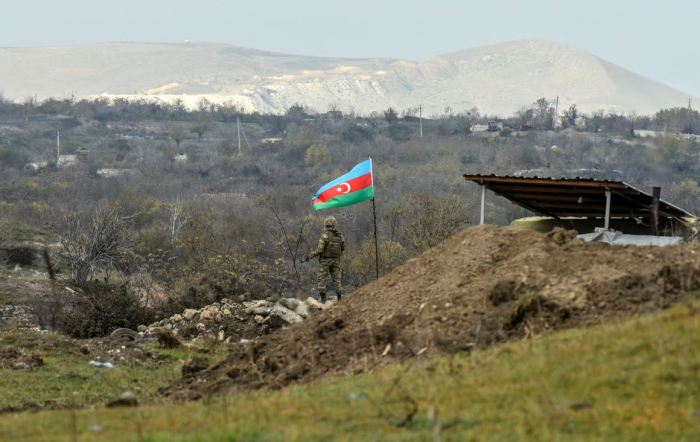In the latest episode of "Contemplations with Orkhan Amashov", the author elucidates on the monumental significance of Azerbaijan’s anti-terrorist measures, conducted between 19 and 20 September, and the prospects offered in their aftermath. Please note that at the time of the programme’s preparation, the so-called former separatist "state minister" of Karabakh, Ruben Vardanyan was still at large.
"A new dawn has broken and Azerbaijan has now fully restored its de facto sovereignty over Karabakh. Indeed, the counterterrorism measures conducted by Azerbaijan from 19 to 20 September, during the course of which pinpoint strikes by the Azerbaijani Armed Forces disabled the Armenian military infrastructure, illegally present in Karabakh, with every attempt having been made to minimise any form of collateral damage to the local civilians, have achieved something monumental.
The grey zone in Karabakh, wherein the separatist junta, propped up by Armenia both financially and militarily, and the formations of Armenia's Armed Forces and illegal Armenian armed groups, amounting to 10,000 troops, were present, is now being dismantled and scrapped.
The separatist junta is now practically dissolved, and disarmament is underway, with dialogue between Baku and representatives of the Karabakh Armenians resuming. The meetings held on 21 and 25 September have been very encouraging; in practical terms, what we observe now is the infrastructural integration of the part of Karabakh wherein the Russian contingent is temporarily deployed into the remainder of Azerbaijan. For instance, the city of Khankendi is now disconnected from Armenia and connected to the energy grid of Azerbaijan.
Subsequent to the de facto restoration of Azerbaijani sovereignty over Karabakh on 20 September, the significance of the 5 October Granada meeting between President Ilham Aliyev and Armenian Prime Minister Nikol Pashinyan has considerably increased. Since the Karabakh component was the key impediment hindering peace talks, now the rift between Baku and Yerevan seems to have been curtailed. With disarmament, demobilisation and reintegration (DDR) measures being implemented on the ground in Karabakh, there are no significant hurdles in moving swiftly towards the long-awaited peace deal between Baku and Yerevan.
What needs to be added to the landscape is the renunciation by Pashinyan of his international mechanism demands to address the security and rights of the Karabakh Armenians. Is he capable of such a recalibration? This is an open question, knowing of his tendency to cow to the prevailing wind. However, Pashinyan is capable of acting ‘courageously’ under duress.
What is it about the Armenian residents of Karabakh? It is ‘ostensibly strange’ that those Armenian political figures, experts and activists presently advocating the mass exodus of Karabakh's Armenian residents are those describing current evacuations as indicative of so-called ‘ethnic cleansing’. The focus must be on maintaining the Armenian population in the region and envisaging a path forward through the context of reintegration. Baku is certainly not encouraging such an exodus, viewing such evacuations as being driven by the personal choice of the local Armenians at the present juncture.
Numerous interviews taken at the Lachin border checkpoint reveal that, amongst those departing, there are three categories: a) those recently settled by the Armenian government in Khankendi and its outskirts to bolster the population, thereby not automatically qualifying as Karabakh Armenians, who see their future outside Azerbaijan; b) those who could potentially successfully apply for Azerbaijani citizenship later, but unwilling to do so, due to their deeply-entrenched views; c) and those who are leaving to return to whence they came. At any rate, Baku appears to be committed to providing a dignified existence for the Armenian residents of Karabakh as Azerbaijani citizens, but Baku won’t ‘beg’ them to stay. It is a matter of choice. Everyone is entitled to decide his destiny.
It should also be borne in mind that the reintegration of the Armenians of Karabakh into Azerbaijan, inter alia, involves the mirror return of ethnic Azerbaijanis into Khankendi and its outskirts. Face-to-face human contacts are key, and some of the videos circulating in the Azerbaijani media today have revealed one very powerful point: despite the fact the enmity between Azerbaijanis and Armenians, in general, is strong and will remain a reality for the foreseeable future, it is also largely contrived and incorrigibly sustained by the Armenian diaspora and considerable segments of Armenian society and, when it comes to the Karabakh Armenians, with the application of goodwill and common sense, there is nothing unthinkable and beyond the realms of possibility. In fact, it is more than doable, and my feeling is it will be achieved very soon. Left alone, human beings have much more commonalities than differences.
More about:
















































